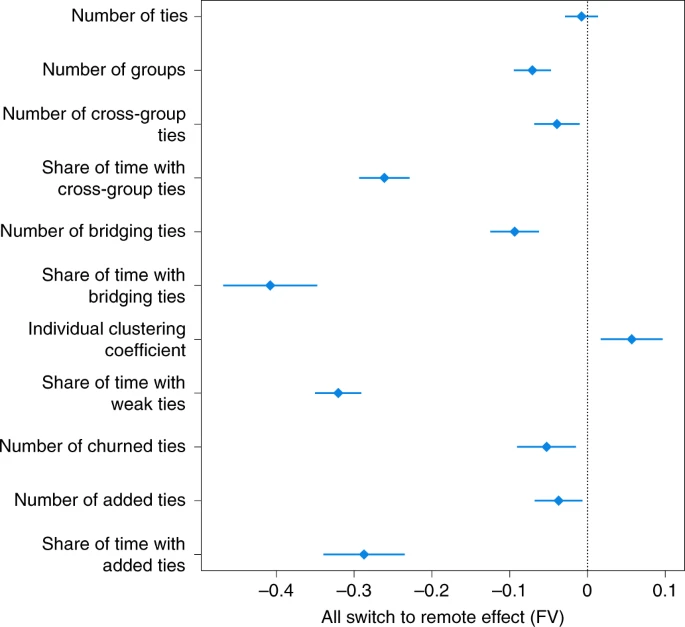A new study published in Nature shows that hybrid or remote working leads to a loss of collaboration across the organisational siloes, which is likely to inhibit the flow of knowledge.
The study is called "The effects of remote work on collaboration among information workers", with 9 authors, and was published on 9 Sept 2021. It looks at the working habits of over 60,000 US Microsoft employees before and after the pandemic, and looks at how work habits shifted as working became remote.
There are several very interesting graphs in the article which show how working habits changed as Microsoft moved to remote working in early 2020. The graph shown here (linked from the article) looks at how the number of "ties" changed as remote working was introduced - ties being an organisational connection which is either strong lots of (regular interaction), weak (occasional interaction) or bridging (someone in a different division or team). Bridging ties are one of the primary ways in which knowledge flows from group to group, division to division and project to project.
You can see how time spent with weak, cross-group, new (added) or bridging ties dropped significantly as the workers moved to remote working.
The study concludes the following (with my emphasis added as bold)
Our results suggest that shifting to firm-wide remote work caused the collaboration network to become more heavily siloed—with fewer ties that cut across formal business units or bridge structural holes in Microsoft’s informal collaboration network—and that those silos became more densely connected. Furthermore, the network became more static, with fewer ties added and deleted per month. Previous research suggests that these changes in collaboration patterns may impede the transfer of knowledge and reduce the quality of workers’ output.Our results also indicate that the shift to firm-wide remote work caused synchronous communication to decrease and asynchronous communication to increase. Not only were the communication media that workers used less synchronous, but they were also less ‘rich’ (for example, email and IM). These changes in communication media may have made it more difficult for workers to convey and process complex information.
Remote working, and by extension hybrid working, brings risks of more siloed teams, less knowledge sharing between weak ties, and less knowledge sharing across teams. It brings risks of more communication on tasks and actions, and less communication of knowledge. It brings risk to effective knowledge management.
How can KM mitigate this silo risk?
Firstly, let's acknowledge that silos have their place, and are a great place to "get the job done". The risk with silos is that their thinking is limited, as are their learning opportunities, and the job does not always "get done" in the most efficient or effective way. Silos can lead to group-think, to a lack of innovation and growth, and to a stagnation of effort and lack of agility.
We can assume that remote working is likely to be a significant component of the world of work for the short term, and possibly the medium and long term as well. We therefore need to have an approach to knowledge management which;
- deliberately and actively promotes and supports cross-silo working;
- strengthens weak ties;
- increases interaction with bridging ties;
- when working remotely or in a hybrid setting.
Unfortunately there is no long history of knowledge sharing in remote and hybrid organisations, as this is a relatively recent development, at least on the scale that we see, and there is therefore no current best practice model for KM in such a context.
Possibly the most useful model we can look at is the multinationals, or organisations with many branch offices, where KM has had to deal with people working remotely from each other in a geographic sense. In many ways, with modern remote working, everyone is their own site office, so how do organisations with multiple site offices manage knowledge?
The management framework such organisations use for KM tends to work as follows:
- To cross the silos, and to build the "bridging ties", a set of Communities of Practice (CoPs) is defined, each one covering an area of practice which cross-cuts the team/division structure;
- These Communities act as mutual help groups, helping members find knowledge and experience to solve their problems (and therefore most of the traffic in the CoPs is driven by problems and questions);
- These CoPs are recognised organisational entities, with specific roles;
- There is a pervasive culture, supported, modelled and specifically expected by management, that people will use the knowledge of the CoP in solving any problem;
- Work projects may start with a Knowledge Gap Analysis session, which prompts people to reach out to their CoPs and weak ties;
- The CoPs work asynchronously as well as synchronously; through question-driven online forums backed up where needed by richer real-time conversations;
- The CoPs take a major role in validating and stewarding the organisational knowledge base for their practice area;
- Often there is an expertise locator in the organisation, where you can search for people by knowledge topic, and so staff can find others, outside their current circle of contacts (added ties) who can share knowledge to help solve problems;
- Work projects include activities for discussion of knowledge, such as Retrospects, After Action Reviews, Peer Assist etc, which not only drive knowledge sharing within the project team, but also help people become conscious of that they have learned, and so able to respond to CoP requests on that topic.
There is some evidence that the popularity of Communities of practice as a KM tool is waning. However now may be the time that we need them more then ever. The study cited here shows that a hybrid or remote-working organisation is heavily siloed organisation, and that a dual focus KM model, including project teams and CoPs, may be crucial in ensuring that innovation and work quality are sustained.





No comments:
Post a Comment